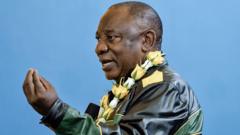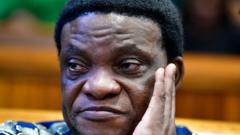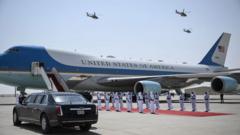President Cyril Ramaphosa of South Africa is set to meet with US President Donald Trump in a crucial attempt to mend fraught relations between the two countries. Both leaders have faced their share of challenges, particularly regarding trade and contentious political rhetoric. As Ramaphosa showcases his renowned negotiation skills, the meeting presents an opportunity to redefine diplomatic ties and address pressing issues.
Navigating Diplomacy: Ramaphosa's Bid to Strengthen US-South Africa Relations

Navigating Diplomacy: Ramaphosa's Bid to Strengthen US-South Africa Relations
As South Africa's President Cyril Ramaphosa prepares for his inaugural meeting with President Donald Trump, the stakes are high for both nations amid ongoing tensions.
South African President Cyril Ramaphosa is on the cusp of his first official meeting with U.S. President Donald Trump at the White House, a pivotal moment aimed at addressing strained relations between the two nations. Renowned for his negotiating prowess as Nelson Mandela's chief negotiator, Ramaphosa’s charm and diplomacy will be crucial as he attempts to soften the contentious relationship that has developed over the past months.
With trade relations as the focal point, Ramaphosa emphasized the importance of securing a favorable agreement during his visit to Washington. "We want to come out of the United States with a really good trade deal," he stated, expressing hopes to fortify connections between the two countries. However, the Trump administration’s silence on the upcoming meeting, evidenced by Press Secretary Karoline Leavitt's reluctance to confirm details, raises questions about the potential for progress.
The backdrop to this meeting is cluttered with controversy. Tensions escalated after Trump accused South Africa of committing "genocide" against its Afrikaner population, a claim that has been widely discredited. Ramaphosa's government recently enacted a law facilitating land expropriation without compensation to redress historical inequities, which further complicated diplomatic discussions, especially with an administration known for its sensitivity to race-related issues.
Political analysts have warned Ramaphosa that the stakes are high. Anthoni van Nieuwkerk of the University of South Africa noted that two possible scenarios could unfold during the meeting: a successful reconciliation contingent upon rational dialogue, or a potentially embarrassing confrontation if emotional rhetoric dominates. Ramaphosa is advised to focus on pre-meeting negotiations to minimize the risks of public display during the Oval Office encounter.
The inclusion of professional golfers in Ramaphosa's entourage—as part of a strategy to bond over shared interests—signals a more personal approach to diplomacy, ahead of an invitation for Trump to play golf during the upcoming G20 Summit in South Africa. Prof. Van Nieuwkerk believes that while Ramaphosa has the capability to handle tensions, the South African delegation must address the propaganda influencing Trump's views.
Amid discussions on mutual interests, trade issues will take center stage. South Africa's Economic Minister Vincent Magwenya revealed that the country could see potential loss if the African Growth and Opportunity Act (AGOA), which provides preferential access to the U.S. market, is not extended in the coming year. Nonetheless, the South African delegation does not intend to approach the meeting from a position of desperation; instead, they aim to leverage the geopolitical significance of South Africa and its valuable exports.
Although there are concerns regarding political criticisms within the South African coalition, notably from the Democratic Alliance party, the speaker insisted that the meeting will facilitate an open dialogue about mutual concerns, including the humanitarian crisis in Gaza. As both countries face challenges, this meeting is seen as a vital opportunity to pave the way for normalized relations moving forward.
Ultimately, the expectation is that the meeting will signal the beginning of a comprehensive approach to rectify the strained ties, reaffirming mutual reliance and fostering cooperation between two nations that, despite their differences, share pivotal economic and political goals.




















